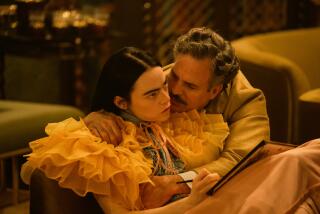MOVIE REVIEW : ‘Kill-Off’ Loses Its Life to Seriousness
- Share via
If excessive elaboration can kill a joke, excessive reverence can hurt a good, low-down story. In a way, that’s what happens to “The Kill-Off” (Monica 4-Plex).
It’s another Jim Thompson-derived movie, adapted from a terrifically grim little 1957 thriller. It has another of Thompson’s memorably unsavory populations, growling and prowling through another brisk, dark saga of amoral cross-purposes, messy murder and the twisty stings of lust and greed.
For the record:
12:00 a.m. Dec. 15, 1990 For the Record
Los Angeles Times Saturday December 15, 1990 Home Edition Calendar Part F Page 7 Column 4 Entertainment Desk 1 inches; 32 words Type of Material: Correction
No rating-- “The Kill-Off,” playing at the Monica 4-Plex, has not been submitted for a rating to the rating board of the Motion Picture Assn. of America. It was incorrectly reported in Friday’s Calendar that the film had been rated R.
Superficially, it’s a mean story about mostly mean people: bullies, drug addicts, bar people, thieves, strippers and blackmailers, in a disheveled little New Jersey vacation town just north of Asbury Park. All these messed-up lives, which coalesce around a vicious, bed-ridden old gossip named Luane Devore (Loretta Gross), are never prettied or brushed up.
Writer-director Maggie Greenwald doesn’t condescend to Thompson. She takes him seriously, understands that there is a tough but humanistic vision boiling under the bleak, hard surface: the hard-nosed, laconic chatter, the soured machismo. But maybe she “understands” it too well.
Thompson, the ultimate example of a writer who concealed his art, is now routinely adapted by filmmakers who wear their art, and the writer’s vaunted nihilism, on their sleeves. Sometimes that makes for good movies, like Bertrand Tavernier’s “Coup de Torchon” (from “Pop. 1,280”) and Stephen Frears’ “The Grifters.” But Greenwald obviously wants to give us Thompson straight up. And, if that’s true, her shot glasses are too shiny, her bar is too bare and no one looks drunk enough.
The movie doesn’t wash us in the creamy lighting and flash stylistics of “After Dark, My Sweet” or “The Grifters,” but it doesn’t sneak up on us either. It’s low-budget, done for about $1 million, but its terseness is studied, forced. Most of the interiors are staged on obvious, underdressed, nearly windowless sets, as if Greenwald was doing “The Iceman Cometh”--a slogging, well-intentioned, off-Broadway production of it--with the characters swimming in and out of the careful, shadowy compositions and studiously spacing out all their lines, pumping them up portentously and letting them echo in the dead air.
There is a nice, grungy, tamped down feel to parts of “The Kill-Off.” But I don’t think it’s either a good movie or a good approximation of the novel. It doesn’t hurt, really, that Greenwald doesn’t try to translate Thompson’s flashy technical experiment here: He told the story, as William Faulkner did in “As I Lay Dying,” in a series of dovetailing subjective narratives from a dozen characters. But she sacrifices the tautness of the structure and doesn’t offer anything very interesting to replace it.
“The Kill-Off” (rated R, for sex, language and violence) isn’t a negligible movie. Greenwald is obviously an intelligent filmmaker. She has assembled a good cast of unknowns: Steve Monroe, as affable would-be wife-killer Ralph, and Andrew Lee Barrett and Jordan Fox, as a strung-out couple, stand out particularly. And, together with ex-U2 cameraman Declan Quinn, she has given this movie a nice, seedy, stylized look. But she hasn’t given it any life.
And, without the illusion of spontaneity, Thompson’s fatalism becomes redundant. No one would ever mistake this movie for a Gold Medal Original, spun right off a ‘50s drugstore rack, and that’s probably what’s wrong with it.
‘The Kill-Off’
Loretta Gross Luane Devore
Jackson Sims Pete Pavlov
Steve Monroe Ralph Devore
Cathy Haase Danny Lee
A Cabriolet presentation. Director/screenplay Maggie Greenwald. Producer Lydia Dean Pilcher. Executive producers Alexander W. Kogen Jr., Barry Tucker. Cinematographer Declan Quinn. Editor James Y. Kwei. Costumes Daryl Kerrigan. Music Evan Lurie. Production design Pamela Woodbridge. Running time: 1 hour, 30 minutes.
MPAA-rated: R (sex, violence, language).
More to Read
Only good movies
Get the Indie Focus newsletter, Mark Olsen's weekly guide to the world of cinema.
You may occasionally receive promotional content from the Los Angeles Times.










